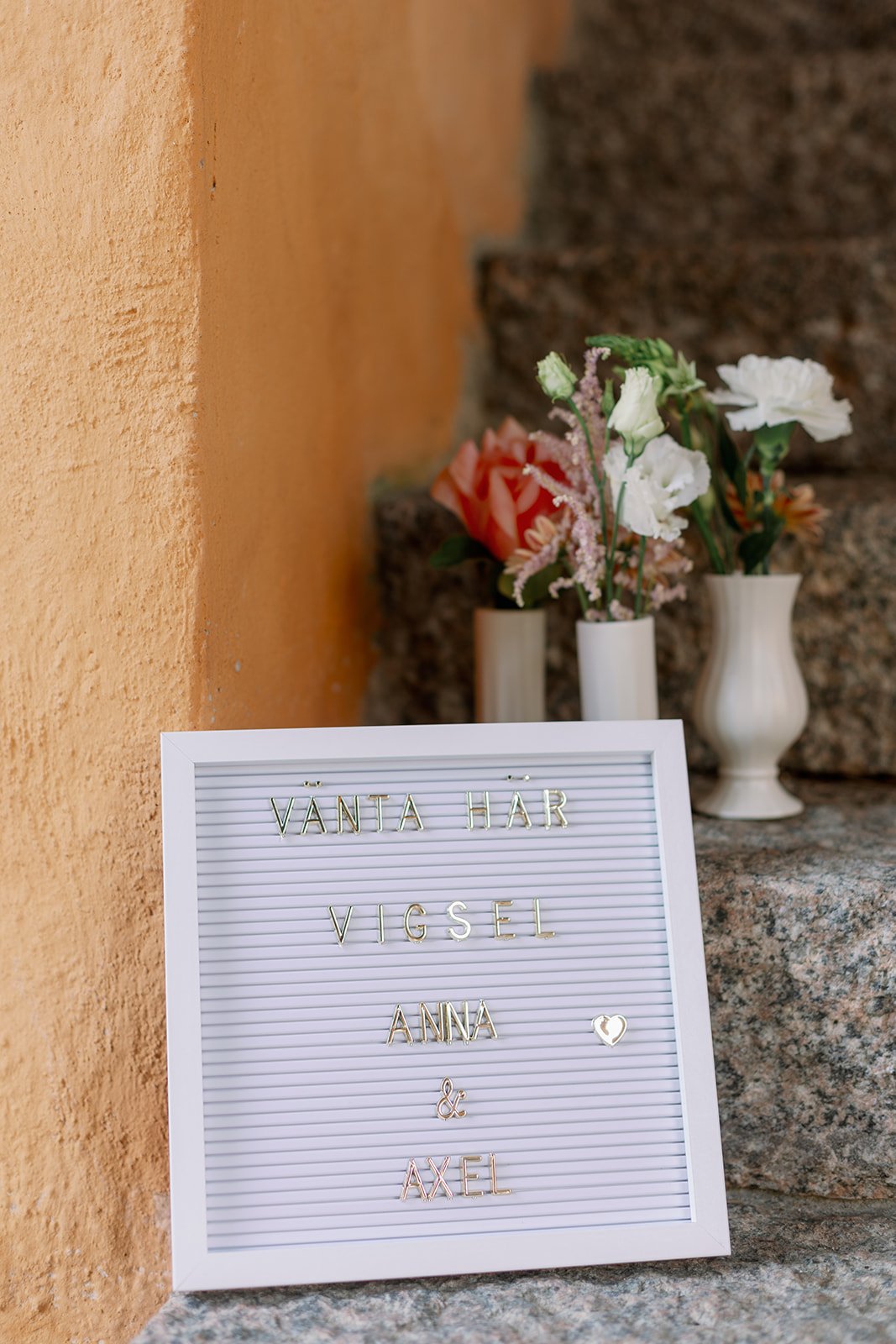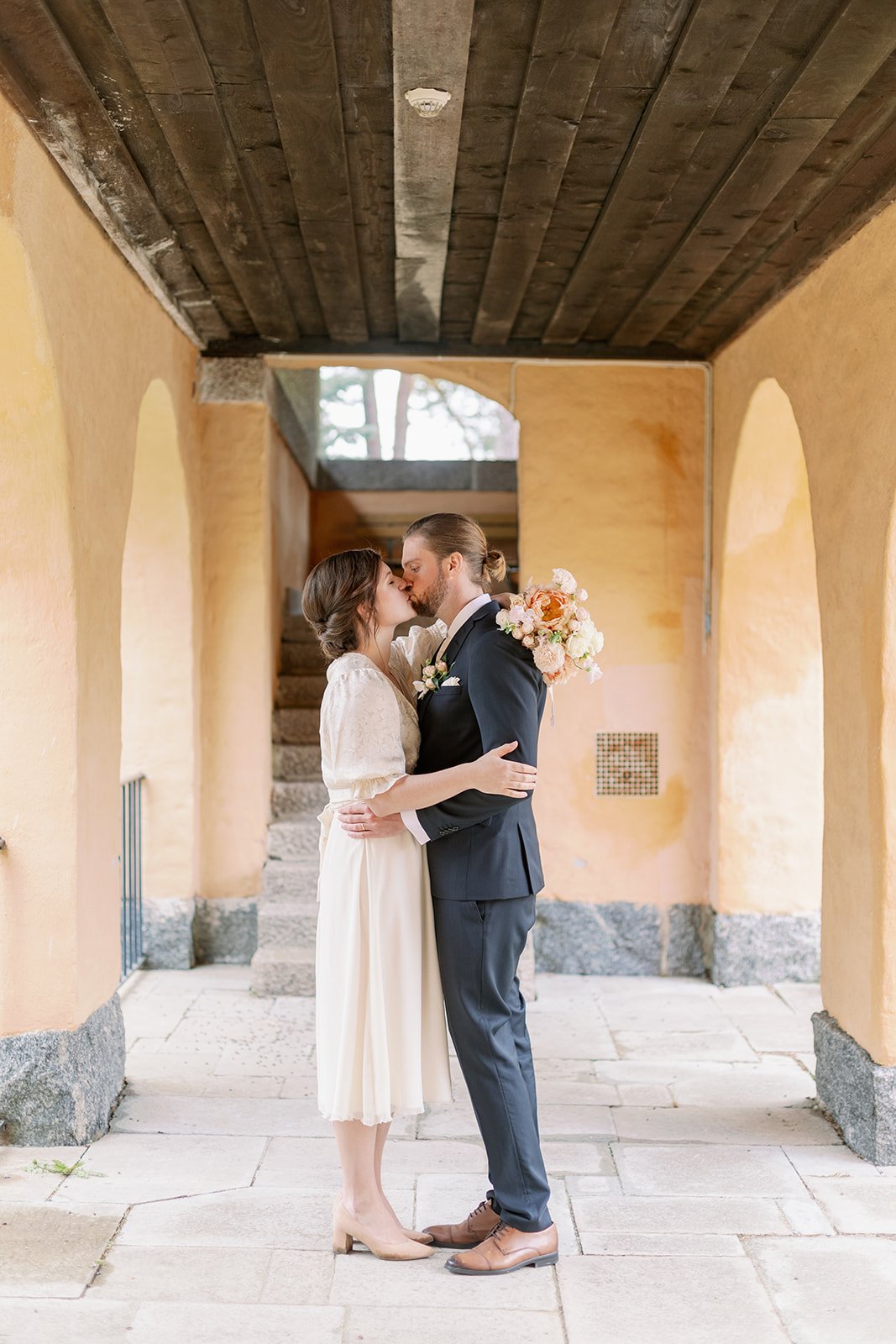Your wedding ceremony - civil or religious?
For weddings in Sweden there are few options when it comes to your ceremony.
You can choose to marry in the City hall where you have a civil ceremony, you can have a civil celebrant come to you, or have a religious ceremony take place in any religious building or place that has been registered for worship and marriages.
Christianity is the main religion in Sweden and you can find information about getting married in the Swedish church at Svenska Kyrkan and if you want to get married civilly contact the local municipality in the region you are planning to marry.
CEREMONY
Have you thought about what type of ceremony you would like?
When you see your wedding in front of you, do you picture yourselves standing outside under the trees or on a beach, or are you seeing the large doors to the church open up and music from the organ playing?
Having an idea of the type of ceremony you would like is good and if you see this differently, talk about it now. Decide what is important to each of you, and investigate the different options available.
Deciding on how you want the ceremony to be can prove tricky sometimes as your partner might be wanting something completely different from you, or your families expect you to wed according to a certain tradition.
Listen to each other, try to understand all points of views and be kind. If one of you is religious it might actually be more important to that part than the other so respect that and see if you can find a compromise.
If the reason you find it hard to decide is because you don’t want to be the center of attention, look up possibilities to marry in the City hall or elope with just your closest friends and family.
Anything works as long as you have two witnesses and someone to legally marry you. And the correct paperwork.
There are many options when it comes to your ceremony. The obvious one is choosing to marry in a civil or religious ceremony.
So, what’s the difference between a civil and religious ceremony?
Civil marriages are without religious elements and do not include hymns, prayers or Bible texts. This means that
civil weddings are much shorter and can take as little as a couple of minutes.
Do you have a fantastic place you love? Do you think it would be possible to get married there? Why not?
You can get married in your own backyard, outdoors in a meadow, on a beach or in the deepest forest.
Oh, personally we love outdoor ceremonies that are held in the middle of nature!
A good thing with that is that you already have the most beautiful surrounding and it doesn’t require much extra decor. It is, however, quite weather dependant.
Many see the outdoors as being in nature but it could also be in the middle of the city, in a hotel or on a rooftop somewhere. As long as you ask for permission from the owner you have the right to marry in a civil ceremony, unless it is in a place of worship/or religious grounds (e.g. an outdoor church).
Many churches are beautiful, and it’s a more traditional choice, for sure. Often people today do it for nostalgic reasons rather than religious, and if that is what you want - go for it!
Look up the church near your hometown or the venue where the reception will be held.
Who would you like to marry you?
If you are planning to have a religious ceremony you will have a priest who is performing the ceremony infront of your guests, in the name of God.
You can ask the priest to marry you outside of the church as well, so a religious ceremony doesn’t have to happen inside.
If you’re not religious, think this through properly, as you will be married in the name of God, and there are certain things the priest has to say in their speech.
If you are going for a civil ceremony you can ask a celebrant from the municipality or city hall to marry you.
What does a civil ceremony look like?
If you choose a civil ceremony you have the possibility to change the speech, decide what to include and not, and basically design the whole thing yourselves together with the celebrant. Make sure the celebrant is someone you have chemistry with.
The instructions for civil marriage do not require anything additional, but it does happen that the officiant says a
few words.
The usual ceremonial speech that the officiant reads is similar to this:
"You want to marry each other. Marriage is based on love and trust.
By marrying, you promise to respect and support each other.
As spouses, you are two independent individuals who can draw strength from your community.
Since you have declared that you want to marry each other, I ask:
Do you want N.N. take this N.N. to your wife / husband to love her / him in need and desire?
(Answer yes.)
Do you want N.N. take this N.N. to your wife / husband to love her / him in need and desire?
(Answer yes.)
(The pair can exchange rings.)
I pronounce you husband and wife/husband and husband/wife and wife!
When you now go out into life and back to everyday life, it remembers the will to the community, the love for
each other and the respect for each other that you felt in this moment and that led here.
Let me wish you happiness and prosperity in your marriage. "
The civil wedding ceremony can last almost as long as you want it to be.
If you are interested in reading about a religious ceremony in Sweden (Svenska Kyrkan), please go inte their website.
How can you make it personal?
What you can do is choose an "entrance song" for the processional that is played when you walk into your wedding ceremony and an "exit song" that is played when the wedding is finished, during the recessional.
To make it more personal, you can also choose to read out vows (characteristic promises) to each other, have a beautiful poem, let a song be played or ask one of your guests to sing or say a few words.
This is entirely up to you.
What happens after?
After the marriage ceremony is completed, a marriage certificate is handed over and the officiant or priest notes in a protocol about the wedding.
COMMON ORDER FOR A WEDDING CEREMONY
The Processional - Members of the family and wedding party head down the aisle and either find a seat or take their places on either side of the altar.
Words of Welcome - Once everyone is in place, the officiant welcomes guests to the celebrations and thanks them for witnessing the union.
Opening and Introduction - The officiant makes an introduction and gives some thoughts on love, marriage and the couple. (Notice that civil ceremonies don’t have any set attributes whereas religious ones usually does.)
Readings - Chosen readers are introduced and invited up to share a few words or sing.
Exchange of Vows - The couple exchange vows and place the rings on each other’s fingers as a symbol of marriage.
The Kiss - After the vows and rings are exchange the marriage is sealed by a kiss.
Unity Ceremony - Something that physically symbolises the union. (Examples are unity candles; mixing sands, waters or wines; tying the knot; unity with flowers often including family members; writing love letters for anniversaries; planting plants or trees. You can also use this time to have your witnesses officially sign the papers.)
Final Blessings - In case of a religious ceremony there is a final prayer.
The Recessional - The officiant introduces the married couple for the first time and then the couple leads the recessional back up the aisle as guests shower them with confetti or applause.

